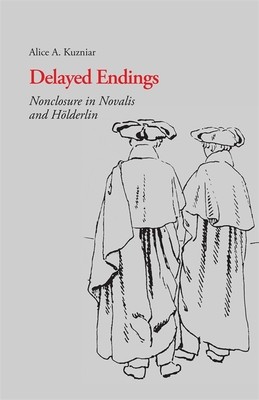
- We will send in 10–14 business days.
- Author: Alice A Kuzniar
- Publisher: University of Georgia Press
- ISBN-10: 0820332445
- ISBN-13: 9780820332444
- Format: 14 x 21.6 x 1.5 cm, softcover
- Language: English
- SAVE -10% with code: EXTRA
Reviews
Description
The works of the German Romantic authors Novalis (Friedrich von Hardenberg) and Friedrich Hölderlin were profoundly affected by their loss of belief in endings and ultimacies. They wrote during an age of intellectual crisis, when apocalyptic expectations had reached their pitch and the volatile ideas generated by the French Revolution seemed to challenge even the passing of time itself.
In Delayed Endings, Alice A. Kuzniar demonstrates how Novalis and Hölderlin exemplified the Romantics' new way of narrating time, and how their method of nonclosure, or the deliberate avoidance of resolution and the strategies that bring it about, united the narrative, semantic, and thematic strains of their work. Novalis's Heinrich von Ofterdingen not only lacks a conclusion but even has a ruptured and disoriented beginning. Sharing Novalis's obsession with deferred endings, Hölderlin's late verse fragments and revisions reflect his questioning of ultimate human endings. Just as the persona in his hymn "Patmos" is within close proximity of friends but forever separated from them by treacherous alpine gorges, so too is God near yet incomprehensible. Novalis and Hölderlin represent a generation of writers who no longer perceived themselves as participants in a world of meaningful temporal progression. Introducing Novalis and Hölderlin as masters in the art of sustained deviation and displacement, Alice Kuzniar demonstrates how Romantic writers foreshadowed modern critical thought in their mistrust of completed artifice and their circumvention of the reader's desire for closure.EXTRA 10 % discount with code: EXTRA
The promotion ends in 15d.02:50:21
The discount code is valid when purchasing from 10 €. Discounts do not stack.
- Author: Alice A Kuzniar
- Publisher: University of Georgia Press
- ISBN-10: 0820332445
- ISBN-13: 9780820332444
- Format: 14 x 21.6 x 1.5 cm, softcover
- Language: English English
The works of the German Romantic authors Novalis (Friedrich von Hardenberg) and Friedrich Hölderlin were profoundly affected by their loss of belief in endings and ultimacies. They wrote during an age of intellectual crisis, when apocalyptic expectations had reached their pitch and the volatile ideas generated by the French Revolution seemed to challenge even the passing of time itself.
In Delayed Endings, Alice A. Kuzniar demonstrates how Novalis and Hölderlin exemplified the Romantics' new way of narrating time, and how their method of nonclosure, or the deliberate avoidance of resolution and the strategies that bring it about, united the narrative, semantic, and thematic strains of their work. Novalis's Heinrich von Ofterdingen not only lacks a conclusion but even has a ruptured and disoriented beginning. Sharing Novalis's obsession with deferred endings, Hölderlin's late verse fragments and revisions reflect his questioning of ultimate human endings. Just as the persona in his hymn "Patmos" is within close proximity of friends but forever separated from them by treacherous alpine gorges, so too is God near yet incomprehensible. Novalis and Hölderlin represent a generation of writers who no longer perceived themselves as participants in a world of meaningful temporal progression. Introducing Novalis and Hölderlin as masters in the art of sustained deviation and displacement, Alice Kuzniar demonstrates how Romantic writers foreshadowed modern critical thought in their mistrust of completed artifice and their circumvention of the reader's desire for closure.

Reviews